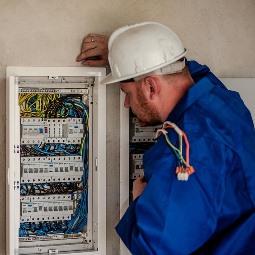How to Enroll in the Right Trade School near Gifford Iowa
 Deciding to work in a new occupation and enroll in a vocational school near Gifford IA are important decisions that will profoundly influence your long term career. But with so many vocational schools to pick from, exactly how do you undertake identifying the ideal one? Not only do you have to make certain that you will obtain the comprehensive training needed to be successful in your new field, but also that the school is reputable and well regarded. A number of students make the error of choosing a trade school just because the campus is closest to their home or place of employment. Others might be attracted to the one that charges the lowest tuition. Of course the location and cost of the programs are important considerations when assessing vocational school options, but they can not be the sole ones. Additional considerations including accreditation and the reputation of the schools are important also. So before you begin evaluating and comparing trade schools, you will need to know what questions to ask in order to get the information to make a final choice. We will address several of those questions shortly in this article. But first, let’s talk about a few of the vocation options that are available as well as the availability of online schools.
Deciding to work in a new occupation and enroll in a vocational school near Gifford IA are important decisions that will profoundly influence your long term career. But with so many vocational schools to pick from, exactly how do you undertake identifying the ideal one? Not only do you have to make certain that you will obtain the comprehensive training needed to be successful in your new field, but also that the school is reputable and well regarded. A number of students make the error of choosing a trade school just because the campus is closest to their home or place of employment. Others might be attracted to the one that charges the lowest tuition. Of course the location and cost of the programs are important considerations when assessing vocational school options, but they can not be the sole ones. Additional considerations including accreditation and the reputation of the schools are important also. So before you begin evaluating and comparing trade schools, you will need to know what questions to ask in order to get the information to make a final choice. We will address several of those questions shortly in this article. But first, let’s talk about a few of the vocation options that are available as well as the availability of online schools.
Vocational School Career Options near Gifford IA
 There are a number of trades to pick from in vocational schools that offer fulfilling and high paying careers. Perhaps you have already selected one that you have long wished to pursue. For instance, maybe you have always had fun working on your car and have given thought to utilizing that ability to earn a living as an auto mechanic. Or perhaps a relative has had a long and successful career in a certain vocation or trade and you would love to follow in his or her footsteps. Regardless of what your inspiration is for entering a trade, there is undoubtedly a program available that will give you the training you require. Below is merely a modest representation of the vocational training programs that are available in the Gifford IA area.
There are a number of trades to pick from in vocational schools that offer fulfilling and high paying careers. Perhaps you have already selected one that you have long wished to pursue. For instance, maybe you have always had fun working on your car and have given thought to utilizing that ability to earn a living as an auto mechanic. Or perhaps a relative has had a long and successful career in a certain vocation or trade and you would love to follow in his or her footsteps. Regardless of what your inspiration is for entering a trade, there is undoubtedly a program available that will give you the training you require. Below is merely a modest representation of the vocational training programs that are available in the Gifford IA area.
- Automotive Technician
- Heating And Air Conditioning (HVAC) Tech
- Plumber
- Electrician
- Welding
- Truck Driving
- Aircraft Maintenance Tech
- Lab Technician
- Construction Management
Each of the programs will have varying costs and completion times based upon the trade, credential earned and school. Some of the programs may be completed in just weeks, while others will call for months or even two or more years of training. All of these factors must be taken into account before selecting a vocation and school.
Click Here to Get Free Information on Trade Schools Near You!
Online Trade Schools
 Online schools have become very popular with Gifford IA students and a growing number of accredited programs are being offered. While learning online is a very convenient and accessible way to obtain a certificate or degree, it may not be the best option for all trades or vocations. For instance, learning to operate a semi truck is not something that you can do online, nor is training how to weld. These are skills that need to be acquired through practical training and by doing it, not by studying or watching videos. But certain elements of the training may be suitable for online classes, for instance studying driving and safety regulations for trucking schools or learning about metallurgy or how to read blueprints for welding schools. Many programs will combine online education with on-campus practical training, such as for HVAC or plumbing schools. So it is very important to find out before enrolling in an online school for any vocation if there is a suitable amount of hands-on training allocated to the course of study. One way to help ensure that a vocational school program is both appropriate for online education and delivers comprehensive practical training is to verify that it’s accredited by a nationally recognized accrediting organization (more on accreditation later). For those trades that are suitable for training online, it can be a convenient way for individuals with limited time to acquire a new profession.
Online schools have become very popular with Gifford IA students and a growing number of accredited programs are being offered. While learning online is a very convenient and accessible way to obtain a certificate or degree, it may not be the best option for all trades or vocations. For instance, learning to operate a semi truck is not something that you can do online, nor is training how to weld. These are skills that need to be acquired through practical training and by doing it, not by studying or watching videos. But certain elements of the training may be suitable for online classes, for instance studying driving and safety regulations for trucking schools or learning about metallurgy or how to read blueprints for welding schools. Many programs will combine online education with on-campus practical training, such as for HVAC or plumbing schools. So it is very important to find out before enrolling in an online school for any vocation if there is a suitable amount of hands-on training allocated to the course of study. One way to help ensure that a vocational school program is both appropriate for online education and delivers comprehensive practical training is to verify that it’s accredited by a nationally recognized accrediting organization (more on accreditation later). For those trades that are suitable for training online, it can be a convenient way for individuals with limited time to acquire a new profession.
Things to Ask Trade School Programs
 After you have decided on the vocation and type of certificate or degree that you desire to obtain, either online or on campus, you can start to narrow down your list of schools. As you are probably aware, there are numerous trade schools in the Gifford IA area and throughout the Country to select from. That’s why it is imperative to have a list of important qualifiers when making school assessments. As earlier mentioned in our opening paragraph, location and tuition will undoubtedly be the first two aspects you will look at. Following are several additional ones that you will want to investigate before enrolling in your school of choice.
After you have decided on the vocation and type of certificate or degree that you desire to obtain, either online or on campus, you can start to narrow down your list of schools. As you are probably aware, there are numerous trade schools in the Gifford IA area and throughout the Country to select from. That’s why it is imperative to have a list of important qualifiers when making school assessments. As earlier mentioned in our opening paragraph, location and tuition will undoubtedly be the first two aspects you will look at. Following are several additional ones that you will want to investigate before enrolling in your school of choice.
Accreditation. Many Gifford IA area technical programs have acquired either a regional or a national accreditation. They can attain Institutional Accreditation, which involves the school’s programs as a whole, or Programmatic Accreditation, which pertains to a specific program, for instance HVAC technology. Make sure that the program is accredited by a U.S. Department of Education recognized accrediting agency, for example the Accreditation Board for Engineering and Technology. Along with helping guarantee that you get a quality education, it may assist in acquiring financial assistance or student loans, which are in many cases not available for non-accredited schools. Additionally, a number of states mandate that the training program be accredited for it to qualify for licensing where applicable.
How Long in Business? One clue to help assess the quality of a trade school near Gifford IA is how long it has been in business. A poorly ranked or a fly by night school usually will not be in business very long, so longevity is a big plus. On the other hand, even the top schools had to start from their first day of training, so consider it as one of several qualifiers.
Completion Rates. Ask the vocational schools you are reviewing what their completion rates are. The completion rate is the portion or percentage of students who enroll in and complete the course. A low completion rate might signify that students were unhappy with the program and dropped out. It may also suggest that the teachers were not competent to instruct the students. It’s similarly important that the schools have high job placement rates. Older and/or more reputable schools may have a broader list of alumni, which can produce more contacts for the school to employ for their apprenticeship and job placement programs. A high job placement rate will not only affirm that the school has an excellent reputation within the industry, but also that it has the network of contacts to help graduates secure apprenticeships or employment in the Gifford IA area.
Apprenticeship Programs. A large number of trade programs are taught along with an internship or an apprenticeship program. Those participating technical and vocational schools will help place you in an apprenticeship program within their network of companies or trade unions. Ask if the schools you are considering have referring relationships with Gifford IA area professionals in the trade. An apprenticeship not only provides a valuable experience by providing hands-on training, but it also furnishes job opportunities and helps to build relationships in the regional professional community.
Modern Facilities. Make certain that the school facilities and the equipment that you will be instructed on are up-to-date and what you will be working with in the field. If you are presently in an internship or an apprenticeship, check with the tech you are working under concerning what you should be looking for. Otherwise, ask a local Gifford IA contractor if they can provide some tips. Additionally keep in mind that unless you can move, the school needs to be within driving distance of your residence. Take note that if you decide to enroll in an out-of-state school, in addition to relocation costs there may be increased tuition charges compared to in-state residents.
Smaller Classes. It’s desirable that you receive as much individualized training as possible, which can be difficult in bigger classes. Ask if you can monitor a few of the classes so that you can see how large they are and experience the interaction between students and teachers. Talk to some of the students and get their feedback regarding class sizes and instruction. Last, speak to some of the teachers and learn what their level of experience is in Iowa and what certifications or degrees they have earned.
Flexible Scheduling. Confirm that the class schedules for the programs you are evaluating are flexible enough to meet your needs. If you can only go to classes at night or on weekends near Gifford IA, check that the schools you are considering provide those options. If you can only attend part-time, make sure that the school you select permits part-time enrollment. Also, ask what the protocol is to make-up classes should you miss any because of work, illness or family issues.
Vocational School Careers Gifford Iowa
 Picking the right trade school near Gifford IA is an important beginning toward a gratifying career in the vocation of your choice. As we have addressed in this article, you should pick a trade school and a certificate or degree program that are both accredited and have exceptional reputations within the trade. Other features to look for are lots of practical training and state-of-the-art facilities. You should go to each of the schools personally that you are most interested in to explore the campus and speak with both the current students and faculty. Try to get a feel for the quality of the instruction and the interaction between them. Also, ask about scheduling options and whether or not evening or weekend classes are available if needed. And remember to inquire about financial assistance and student loan options also. You initially came to this website because of your interest in Vocational School Careers and wanting more information on the topic Career Technical School. However, if you ask the appropriate questions as we have laid out in our checklist for evaluating schools, you’ll be able to narrow down your options so that you can make an educated decision. With the right training, hard work and commitment, you can eventually become a licensed professional in your chosen trade.
Picking the right trade school near Gifford IA is an important beginning toward a gratifying career in the vocation of your choice. As we have addressed in this article, you should pick a trade school and a certificate or degree program that are both accredited and have exceptional reputations within the trade. Other features to look for are lots of practical training and state-of-the-art facilities. You should go to each of the schools personally that you are most interested in to explore the campus and speak with both the current students and faculty. Try to get a feel for the quality of the instruction and the interaction between them. Also, ask about scheduling options and whether or not evening or weekend classes are available if needed. And remember to inquire about financial assistance and student loan options also. You initially came to this website because of your interest in Vocational School Careers and wanting more information on the topic Career Technical School. However, if you ask the appropriate questions as we have laid out in our checklist for evaluating schools, you’ll be able to narrow down your options so that you can make an educated decision. With the right training, hard work and commitment, you can eventually become a licensed professional in your chosen trade.
Other Iowa Hard Working Locations
Omaha–Council Bluffs metropolitan area
The Omaha Metropolitan Area, officially known as the Omaha-Council Bluffs, NE-IA Metropolitan Statistical Area (MSA), is an urbanized region centered on the city of Omaha, Nebraska. The region extends over a large area on both sides of the Missouri River in Nebraska and Iowa, in the American Midwest. The Omaha Metropolitan Area is the 59th largest in the United States, with an estimated population of 933,316 (2017).[1] As defined by the Office of Management and Budget, it consists of eight counties—five in Nebraska and three in Iowa.[2][3] The region is locally referred to as "Greater Omaha", "the Metro Area", "the Metro", or simply "Omaha". The core counties of Douglas and Sarpy in Nebraska and Pottawattamie in Iowa contain large urbanized areas; the other five counties consist primarily of rural communities.
The Omaha-Council Bluffs-Fremont, NE-IA Combined Statistical Area (CSA) encompasses the Omaha-Council Bluffs MSA as well as the separate Fremont, NE Micropolitan Statistical Area, which consists of the entirety of Dodge County, Nebraska. The total population of the CSA was 970,023 based on 2017 estimates.[4]
Standard definitions for United States metropolitan areas were created in 1949; the first census which had metropolitan area data was the 1950 census. At that time, the Omaha–Council Bluffs metropolitan area comprised three counties: Douglas and Sarpy in Nebraska, and Pottawattamie in Iowa. No additional counties were added to the metropolitan area until 1983, when Washington County, Nebraska was added. Cass County, Nebraska was added in 1993; Saunders County in Nebraska and Harrison and Mills counties in Iowa became part of the Omaha–Council Bluffs metropolitan area in 2003.
